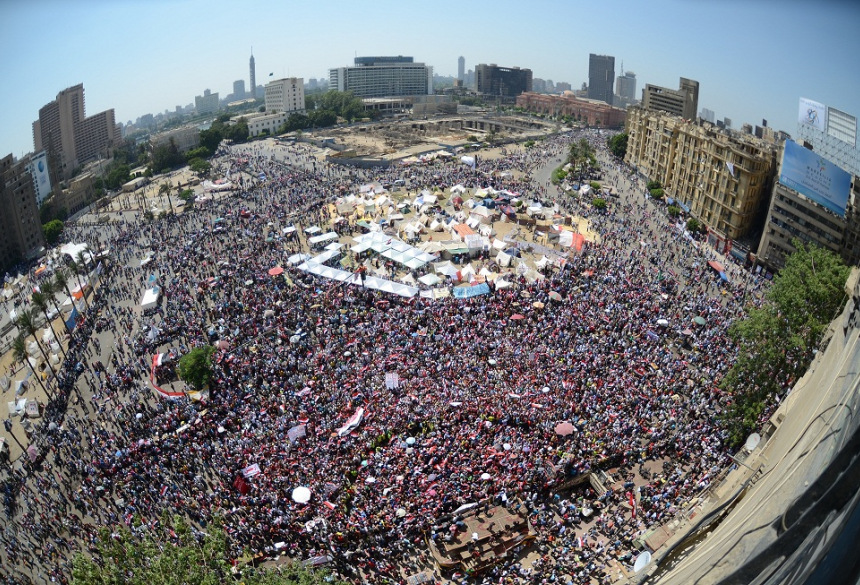
Egyptians and outside observers are arguing fiercely about what exactly has happened in the world’s most populous Arab country: Was it a popular revolt against an inept and domineering Muslim Brotherhood, or a counterrevolution of the ancient regime against the country’s first democratically elected president? Using the word “coup” about this week’s events sparks a barrage of criticism from the secular camp, while justifications for the army’s removal of President Mohamed Morsi on Wednesday are anathema to most Islamists.
What is apparent to all, however, is that the United States has made a hash of its Egypt policy. US officials were late in seeing the crisis coming, and their advice — much of it out of step with events — was ignored by all sides. Consider this tweet from The Big Pharaoh, a secular Egyptian activist prominent on social media: “History will remember that days before #June30, the ambassador of the world’s superpower spent 3 hrs in MB leader Khairat Shater’s office.” The remark underscores how US policy toward Egypt is widely reviled — and misunderstood. The tweet refers to a meeting between US Ambassador Anne Patterson and the political boss of the Muslim Brotherhood shortly before the enormous anti-Morsi demonstrations began; Patterson reportedly pleaded with Shater to persuade Morsi to meet long-standing demands from the opposition, such as forming a politically neutral cabinet and instituting an inclusive process to amend the constitution passed over popular protests late last year. In theory, secularists should have been pleased that the US envoy pushed such an agenda. Instead, they viewed the long meeting as a sign of US-Muslim Brotherhood collusion against democracy.
They’re suspicious because for the past year the United States has focused on building the closest, most cooperative relationship possible with Morsi’s government and has assiduously avoided criticizing his actions — even after he decreed greater powers for himself in November, including declaring his decisions above judicial review, and the next month forced the controversial constitution through via a deeply flawed process.
The Obama administration avoided criticizing Morsi’s undemocratic actions not, as many Egyptians believe, because of a secret alliance with Islamists but because, since Hosni Mubarak’s ouster in February 2011, its policy has been based on fear of losing security cooperation with Egypt — even though no one has threatened to cut it off. The administration has not presented any significant economic or rhetorical support to Egypt’s effort to transition to democracy.
This minimalist approach has led the US government to make one wrong call after another: to wait and see rather than marshaling international economic support early after Mubarak’s removal; ignoring the military-led government’s ugly xenophobic campaign against US nongovernmental organizations when it began in mid-2011; belittling the seriousness of the secular opposition movements over the past year; and failing to press Morsi to compromise until it was already too late. Because of all this, the secularists see the United States as having stuck with Mubarak and then Morsi until the end, and the Brotherhood views Washington as having once more decided that Islamists do not get to win elections. As Morsi’s foreign affairs adviser Essam al-Haddad said in a Facebook post on Wednesday, “the message will resonate throughout the Muslim World loud and clear: democracy is not for Muslims.”
The best option for the United States is to return to core principles. This was a military coup against a democratically elected president. US officials should call it a coup — triggering the congressionally mandated suspension of assistance to the Egyptian military until there is a return to democratic civilian rule — while acknowledging that Morsi had himself taken undemocratic steps and provoked widespread opposition among Egyptians.
The United States should then reinvigorate its engagement with key players in Egypt’s secular, Islamist and state institutions and encourage the launch of a much more inclusive, consensus-based transition process than the country has had since 2011. If Egyptian generals and civilian officials want to prove that they are not steering Egypt off a path to democracy, there is much they can do differently to support freedom of expression and human rights. The legal case in which 43 Americans, Egyptians and others were convicted of felonies for carrying out democracy-promotion activities — a case initiated under military rule — should be resolved, and Egyptian and foreign civil society organizations should be allowed to work in peace. The rights of the Brotherhood and other Islamists should be respected, and they should be invited into the political process going forward (though getting their cooperation is likely to be difficult). The military and police should respect human rights amid their efforts to restore calm.
US policy in Egypt based on fear rather than principles has alienated all sides. Instead of focusing on how to avoid calling this week’s events a coup so they can maintain financial aid to the military, US officials ought to be asking how they can use the Egyptian military’s desire to regain international legitimacy after this coup as leverage to press for a rapid return to democratic rule.
Michele Dunne is an Atlantic Council vice president and director of the Atlantic Council’s Rafik Hariri Center for the Middle East.
This article originally appeared in the Washington Post
Image: Tahrir%20DNE_1.jpg
